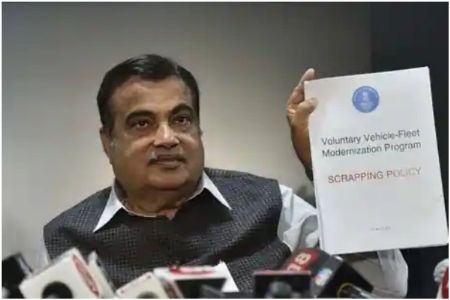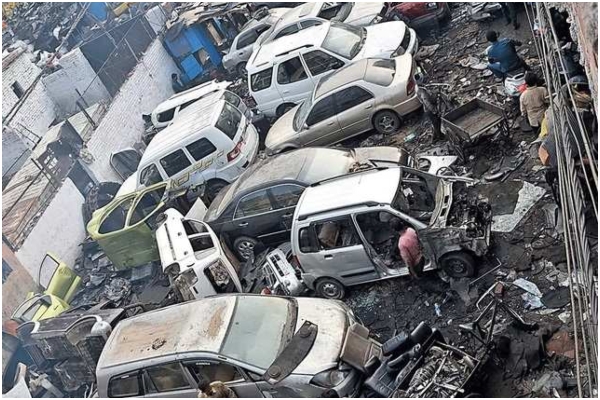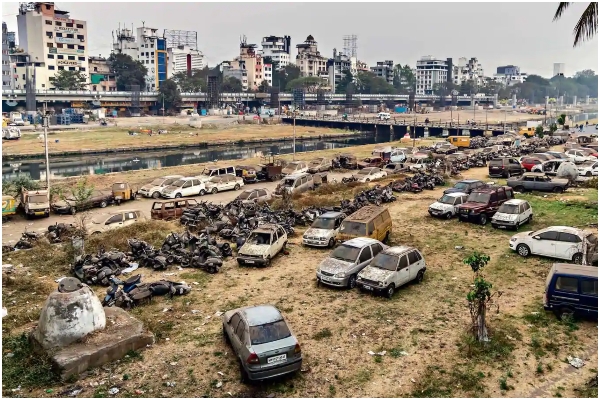Vehicle Scrapping Policy 2020- Key to Reducing Pollution and Unleashing India’s Potential in Automotive Sector
Total Views |
It is an accepted fact today that, the present government does not shy away from big tickets reforms. Be it Financial sector, Agriculture, Insurance, Import, Export or Transport. Government has announce Vehicle Scrapping Policy during this year’s Budget. It was a long awaited reform in Indian transport sector. The new vehicle scrapping policy provides for fitness tests after 20 years for personal vehicles, while commercial vehicles would require it after the completion of 15 years. As said by Union minister Nitin Gadkari during making a statement in Parliament “It will be a “win-win” policy that will eventually help in improving fuel efficiency and reduce pollution”.

Why Scrapping Policy:
The transport sector has seen number of policy initiatives in last few years addressing major concerns of congestion, pollution and road accidents that India faces today. Indian cities have become synonymous with congestion, noise, and air pollution. Each year, 135,000 people die in traffic crashes on Indian roads. Currently, India has 120 million vehicles, a number that is steadily growing. In 2010, outdoor air pollution contributed to more than 620,000 premature deaths.
Air pollution
In the Global Burden of Disease 2010 (GBD) study, ‘outdoor air’ pollution is among the top 10 risks worldwide and the top six risks in the developing countries of Asia. Air pollution has greater impact on countries such as India, as 1.4 million people lost their life due to air pollution. Air pollution is one of the serious environmental concerns of the urban cities. The rapid urbanization in India has resulted in a tremendous increase in the number of motor vehicles. As the number of vehicles continues to grow and the consequent congestion increases, vehicles are now becoming the main source of air pollution in urban India.
Road accidents
India recorded a total of 501,423 road accidents and 146,133 road accident deaths in 2015; this equates to 1,374 accidents and 400 deaths on India’s roads every day. Sadly, 54.1% of people killed in road accidents are in the 15-34 years age group. It is estimated by a study that the economy lost around 3% of GDP (1999-2000) due to road mishaps.
The country has taken a number of measures for the improvement of the air quality in cities. These include, the improvement in the fuel quality, formulation of necessary legislation and enforcement of vehicle emission standards, improved traffic planning and management, etc. Switching to Bharat VI (Euro VI) by 2020 was one such big ticket reform. The government’s decision to shift to Bharat Stage emission standards for various category vehicles by 2020 has made leapfrog directly from Bharat IV (Euro IV) emission norms for petrol and diesel. This is a great move and demonstrates the commitment of the government to curbing air pollution.
Vehicle Scrapping Policy:
India has 51 lakh Light Motor Vehicles which are older than 20 years and 34 lakh Light Motor Vehicles which are older than 15 years. Around 17 lakh Medium and Heavy Commercial Vehicles are older than 15 years without valid fitness certificate. Older vehicles pollute the environment 10 to 12 times more than fit vehicles and pose a risk to road safety.
In the interest of a clean environment and rider and pedestrian safety, the Voluntary Vehicle-Fleet Modernization Program or “Vehicle Scrapping Policy” which is aimed at creating an Eco-System for phasing out of Unfit and Polluting Vehicles. Clearly stating the objectives of the policy, to reduce population of old and defective vehicles, achieve reduction in vehicular air pollutants to fulfill India’s climate commitments, improve road and vehicular safety, achieve better fuel efficiency, formalize the currently informal vehicle scrapping industry and boost availability of low-cost raw materials for automotive, steel and electronics industry.
The ecosystem is expected to attract additional investments of around Rs. 10,000 Crore and 35,000 job opportunities. The ministry has also announced that it shall in the next few weeks publish draft notifications, which shall be in the public domain for a period of 30 days to solicit comments and views of all involved stakeholders.
The criteria for a vehicle to be scrapped is primarily based on the fitness of vehicles through Automated Fitness Centres in case of commercial vehicles and Non-Renewal of Registration in case of private vehicles. Government has adapted these criteria from international best practices and after a comparative study of standards from various countries like Germany, UK, USA and Japan. A Vehicle failing the fitness test or failing to get a renewal of its registration certificate may be declared as End of Life Vehicle. Criteria to determine vehicle fitness will be primarily emission tests, braking, safety equipment among many other tests which are as per the Central Motor Vehicle Rules.

It is proposed that commercial vehicles be de-registered after 15 years in case of failure to get the fitness certificate. As a disincentive measure, increased fees for fitness certificate and fitness test may be applicable for commercial vehicles 15 year onwards from the date of initial registration. Private Vehicles shall be de-registered after 20 years if found unfit or in case of a failure to renew registration certificate. As a disincentive measure, increased re-registration fees will be applicable for private vehicles 15 year onwards from the date of initial registration. Government has also announced, that all vehicles of the Central Government, State Government, Municipal Corporation, Panchayats, State Transport Undertakings, Public Sector Undertakings and autonomous bodies with the Union and State Governments may be de-registered and scrapped after 15 years from the date of registration.
The scrapping policy is expected to provide strong incentives to owners of old vehicles to scrap old and unfit vehicles through registered scrapping centres, which shall provide the owners with a scrapping certificate. Some of these incentives include: Scrap Value for the old vehicle given by the scrapping centre, which is approximately 4-6% of ex-showroom price of a new vehicle, the state governments shall also offer a road- tax rebate of up to 25% for personal vehicles and up to 15% for commercial vehicles and the vehicle manufacturers are also expected to provide a discount of 5% on purchase of new vehicle against the scrapping certificate. In addition, the registration fees may also be waived for purchase of new vehicle against the scrapping certificate.
The Ministry of Road Transport and Highways shall be promoting setting up of Registered Vehicle Scrapping Facility (RVSF) across India and will encourage public and private participation for opening up of such centres. Efforts are also being made to set up Integrated Scrapping Facilities across India. It is being planned to develop a highly specialized centre for scrapping among many other potential centres, where different scrapping technologies can be synergized together. With a simplified registration process through single window, the scrapping facility shall have to comply with environmental and pollution norms and with all applicable acts of law. It shall be ensured that the scrapping centres have de-pollution equipments for air, water and sound pollution and adequate facilities for hazardous waste management and disposal. Similarly, the Ministry shall promote setting up of Automated Fitness Centres on a PPP model by state government, private sector automobile companies.
Atmanirbhar Bharat Key for Automobile Sector:
While government has given a clear road map with stated objective of Creating a citizen centric policy and to promote reduced cost of owning vehicles due to lower fuel consumption and maintenance cost, Increased safety for passengers, Boost investments ( Rs. 10000 crore) and job opportunities (35000), Availability of low-cost raw materials for steel industry and other rare-earth metals, Bringing the informal vehicle scrapping industry into formal sector and Reduced vehicular pollution and fulfilling India’s climate commitments. It also envisage the larger objective of Atmanirbhar Bharat for Transport and Automotive sector. It is estimated that on an average, about 75 kgs of Scrap steel is generated from a most popular two-wheeler which normally weighs around 100 - 110 kgs, while about 650 kgs of steel scrap is generated from a lower segment passenger car which could typically weigh around 1,000 kgs. As far as a CV is concerned 16 ton GVW Buses & Trucks having kerb weight around 9,000 kg will have a steel of about 6,000 kgs. Assuming, the scrap value of steel would be about Rs 25 per kg, the scrap value from a two-wheeler would be about Rs 1,875, from a car about Rs 16,250 and from a HCV around Rs 1,50,000.
Automobile Sector: Major Contributor to Economy & Employment
Today India’s automotive industry is equivalent to 6.4% of India’s GDP and 35% of India’s manufacturing GDP. It is estimated that the industry supports employment for 3.7 crore persons, directly and indirectly, in various occupations which includes low skilled, semi-skilled and highly skilled jobs. The capability of the auto sector to create indirect jobs, is massive. As per a study report, every passenger vehicle produced provides employment to more than 5 persons, a Medium & Heavy Commercial Vehicle to 13 persons, a three-wheeler to 4 persons and 2 units of two-wheelers to 1 person. The Indian automobile industry ranks 4th in terms of volumes produced in the country.

The auto industry comprises of home-grown players and MNCs, together who are working on R&D for technological enhancement and improving the Design Capabilities in the country. The industry has developed unique India specific products and to meet the requirement of our people and are also popular in other developing and under-developed countries. Automotive industry is a significant driver of FDI in India with 5% of total FDI inflows in the automotive sector. Exports of automotive products account for nearly 8% of the merchandize exports from India. These products go to more than 150 nations, globally, and are establishing India’s image as an engineering and manufacturing prowess. The industry is also a major source of revenue to the ex-chequer, with Rs 1.5 lakh crore GST revenue generated through vehicle sales, which amounts to nearly 15% of the overall GST revenue.
The Scrapping Policy with incentives in the form of rebates in GST, Road tax & Registration Tax, would encourage vehicle owners to voluntarily scrap their old vehicles, which will have all round benefit both for the Economy and the Environment. Since the Policy would result in purchase of new vehicle, it will generate additional GST revenue for the Government, which will ultimately be revenue positive to the Government against the incentive that would be given by the Government, under the policy. As per Industry estimates, this Policy could generate additional annual demand in the market of about 8 lakh vehicles ranging from Passenger Vehicles, Commercial Vehicles, Three Wheelers and Two-Wheelers. The replacement sale with new vehicles could lead to a saving of about 350 million litres of fuel per annum, apart from about 1 million tons of CO2 and 14 thousand tons of Particulate Matter per annum. Apart from huge benefit to Environment, the scheme would also have an additional advantage of new infrastructure being created of Recycling Centres, generating employment in various parts of the country. The Recycling Centres will also generate scrap of Steel, Cast Iron, Aluminium, Copper, etc. which is presently in very high demand and would help in saving of valuable foreign exchange which is spent on importing these metals. Recycling of Automobile scrap will lead to saving of Iron Ore, which is used for manufacturing Steel in the country. Policy would provide much needed support to the Industry to pass through this difficult phase.
Despite of COVID 19 challenge, Indian Industry and entrepreneurs have shown a great resilience and phoenix spirit that is unmatched. The vehicle scrapping policy shall provide that much needed push from government for this sector to grow. The step shows governments resolve and commitment on the path of growth and recovery.
.
.
